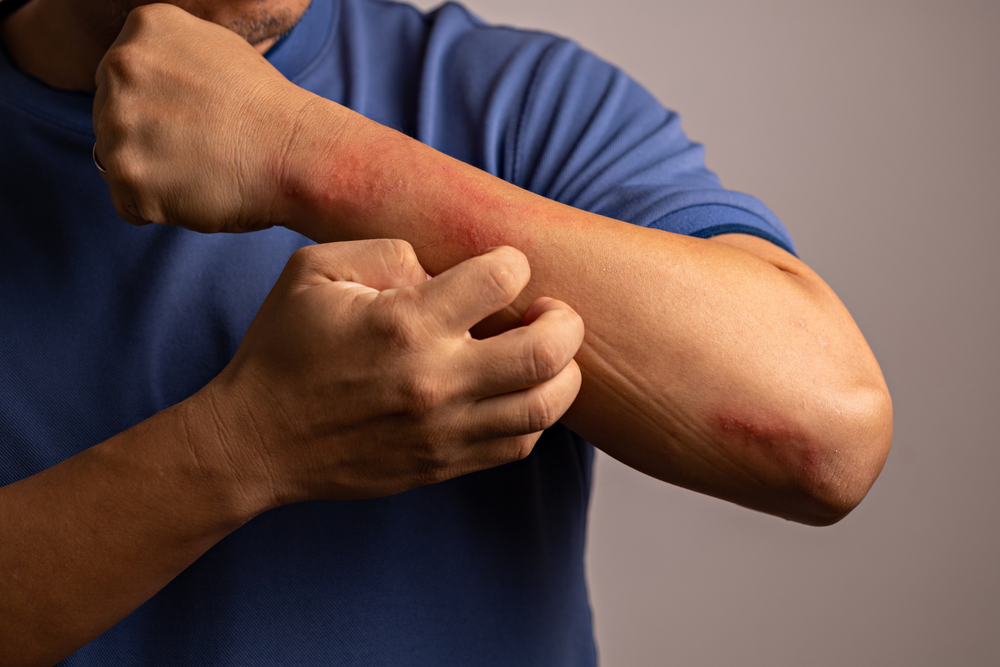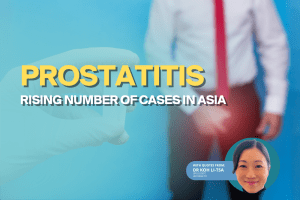Eczema, or atopic dermatitis, is a chronic skin condition characterized by itchy, inflamed skin.
It affects millions of people worldwide, with a notably higher prevalence in Asia. According to research, the prevalence of eczema in Asian adults is up to 11%, which is notably higher than that in the Caucasian population.
What is Eczema?
The term “eczema” is derived from the Greek word “ekzein,” meaning “to boil over,” which aptly describes the appearance of the skin during flare-ups. It affects people of all ages, but it is particularly prevalent among infants and young children, with many outgrowing the condition as they age. The exact cause of the condition remains unknown, but it is believed to be a combination of genetic and environmental factors.
Symptoms may vary among individuals, but common signs include dry, sensitive skin, intense itching, red or brownish-gray patches, small raised bumps that may leak fluid when scratched, and thickened, cracked, or scaly skin. These symptoms often worsen during flare-ups, which can be triggered by various factors such as allergens, irritants, stress, and changes in temperature or humidity.
Is Eczema a Genetic Condition?
A strong genetic component is involved in the development of the condition. The FLG gene, responsible for producing filaggrin—a protein that maintains the skin barrier—plays a crucial role. Mutations in the FLG gene reduce filaggrin levels, leading to a compromised skin barrier.
Notably, these genetic mutations are more common in Asian populations. A study in the Journal of Investigative Dermatology found that the frequency of FLG mutations in East Asian populations is higher when compared to that of Europeans.
Environmental Triggers that Contribute
Environmental factors also contribute to the high prevalence of eczema in Asia. Air pollution can exacerbate symptoms. With rapidly growing urban areas and industrialization, many Asian countries face significant air pollution challenges. High levels of particulate matter, nitrogen dioxide, and other pollutants can irritate the skin, triggering or worsening eczema flare-ups.
The Effects of Climate and Humidity
Asia’s climate plays a role in the high incidence of eczema as well. The region experiences high temperatures and humidity, which can aggravate eczema symptoms. Sweating and increased skin moisture can cause itchiness and inflammation, leading to skin barrier damage.
Allergens and Diet
Asian diets, rich in seafood, soy, and wheat, can expose individuals to common food allergens. Research has shown a link between food allergies and eczema. Consuming allergenic foods can trigger eczema flare-ups, especially in children.
Furthermore, house dust mite allergens are prevalent in Asian households due to the region’s warm and humid climate. Exposure to dust mite allergens is a significant risk factor for its development.
Stress and Lifestyle Factors
Stress and lifestyle factors also contribute to the prevalence of the condition in Asia. High-stress levels can exacerbate eczema symptom. Rapid urbanization and demanding work cultures in Asia have led to increased stress levels, potentially increasing the risk of eczema.
Increased Awareness and Diagnosis
Lastly, the rise in eczema prevalence in Asia could be partially attributed to increased awareness and improved diagnostic capabilities. Healthcare professionals are now better equipped to recognize and diagnose eczema, leading to more accurate prevalence data. The high prevalence of eczema in Asia can be attributed to various factors, including genetic predispositions, environmental triggers, climate, allergens, diet, stress, and lifestyle factors.
Further research and understanding of these factors can help develop targeted prevention and treatment strategies for eczema in Asia. By addressing air pollution, identifying allergenic foods, and managing stress, individuals and communities can work together to reduce the impact of eczema on their lives. Ultimately, increased awareness, improved diagnostics, and better understanding of eczema in Asia will contribute to better management and care for those affected by this chronic skin condition.













